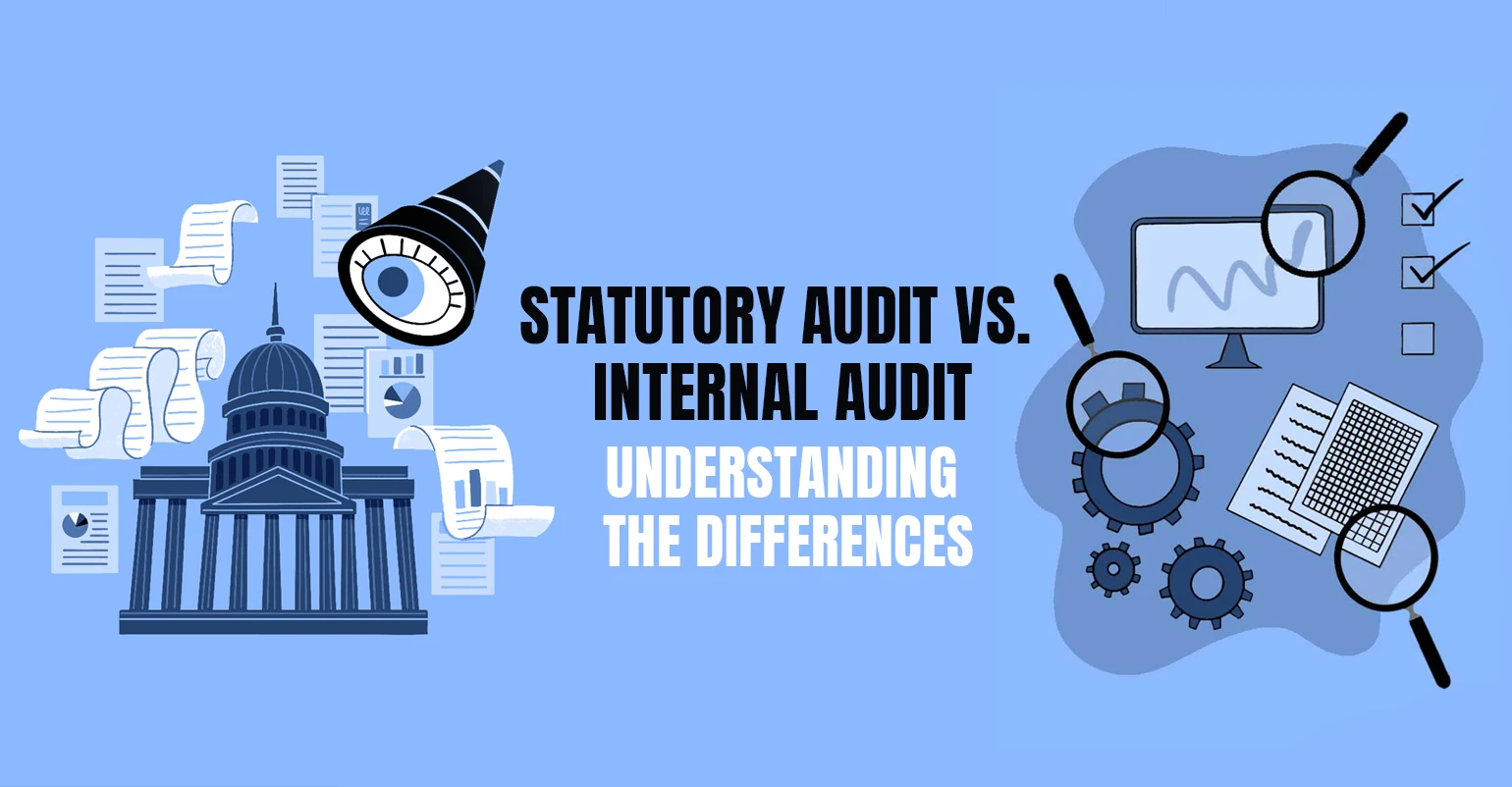In the dynamic realm of business governance, audits play a pivotal role in ensuring transparency, accountability, and effective risk management. Among the various audit types, two prominent ones stand out – Statutory Audits and Internal Audits. In this blog of Excellence Audit & Accounting Service - a leading audit firm in Oman, we delve into the nuances that differentiate these critical examinations of a
company's financial and operational health.
WHAT IS THE DIFFERENCE BETWEEN STATUTORY AUDIT & INTERNAL AUDIT
Statutory Audit is the type of audit which is conducted to ensure the accuracy and fairness of financial statements. It is mandated by law or regulations and is usually performed by external auditors who are independent of the organization. The primary purpose is to provide an opinion on the financial statements' reliability and compliance with accounting standards and legal requirements.
Internal audit is conducted by internal auditors who are employees of the organization. The main
objective is to evaluate and improve the effectiveness of risk management, control, and governance processes within the organization. It is not required by law but is considered a best practice for organizational governance.
Let us dive into more details of these two now:
STATUTORY AUDIT: UNVEILING THE EXTERNAL LENS
Purpose of Statutory Audit:
Statutory Obligation:
Statutory audits are a legal requirement imposed by regulatory bodies or
legislation. The primary objective is to provide external stakeholders with an unbiased evaluation of the company's financial health.
Independent Oversight:
External Auditors: Conducted by external auditors independent of the organization, statutory audits ensure an impartial assessment of financial statements, offering credibility to shareholders, investors, and regulatory bodies.
Scope of Statutory Audit:
Financial Statements: Statutory audits focus predominantly on the accuracy and fairness of financial statements. Balance sheets, income statements, and cash flow statements are meticulously scrutinized to ensure compliance with accounting standards.
Reporting:
Auditor's Report: The culmination of a statutory audit is the issuance of an auditor's report. This report provides an opinion on whether the financial statements represent a true and fair view of the company's
financial position.
Frequency of Statutory Audit:
Annual Basis: Statutory audits are typically an annual affair, ensuring regular scrutiny and disclosure of financial health to external stakeholders.
INTERNAL AUDIT: THE IN-HOUSE GUARDIANS OF GOVERNANCE
Purpose of Internal Audit:
Voluntary or Regulatory:
Internal audits can be voluntarily undertaken by the organization or mandated by regulators. Their primary aim is to enhance internal controls, risk management, and operational efficiency.
Organizational Insight:
Internal Auditors: Internal audits are conducted by internal auditors who are part of the organization's workforce. This internal perspective allows for a more holistic examination of not just financial aspects but also operational processes.
Scope of Internal Audit:
Operational Efficiency: Internal audits have a broader scope, encompassing operational processes, compliance with internal policies, and risk management. They act as a proactive tool for organizational mprovement.
Reporting:
Management Feedback: Internal audit findings are reported directly to the management, providing
actionable insights to improve internal processes and enhance overall organizational governance.
Frequency of Internal Audit:
Regular Basis: Unlike statutory audits, internal audits can be conducted regularly throughout the year, offering a continuous evaluation of internal controls and processes.
Synergy and Collaboration:
While statutory audits ensure external independence, internal and external audits can collaborate to reinforce organizational governance. Internal audits identify areas for improvement, and the external audit provides assurance to external stakeholders.
WHICH IS PREFERABLE, INTERNAL AUDITING OR STATUTORY AUDITING?
Now, most of you will be having this question while surfing through the above. Well, the effectiveness of either a Statutory Audit or an Internal Audit depends on the specific goals and needs of the organization. Both audits serve distinct purposes and offer unique advantages. It's not a matter of one being "better" than the other; rather, they complement each other to ensure comprehensive governance and risk management. factors to consider when determining which audit is more suitable for a particular situation:
● External Validation:
Provides an independent and external validation of the accuracy and fairness of financial statements. The opinion of external auditors enhances credibility and trust among external stakeholders, including investors, regulators, and the public.
● Compliance Assurance:
Ensures compliance with legal and regulatory requirements. For publicly traded companies, statutory audits are often mandatory and are essential for meeting regulatory obligations.
● Shareholder Confidence:
Boosts shareholder confidence as the audit report is a public document that assures investors of the company's financial integrity.
● Holistic Perspective:
Internal audits offer a more comprehensive view by assessing not only financial aspects but also
operational efficiency, internal controls, and risk management. Internal audits help identify areas for improvement and contribute to the overall governance of the organization.
● Proactive Risk Management:
Acts proactively to identify and mitigate risks before they become significant issues. Internal audits provide management with timely insights for decision-making and continuous improvement.
● Operational Efficiency:
Focuses on operational processes, efficiency, and adherence to internal policies. Internal audits contribute to enhancing the effectiveness of day-to-day operations.
● Considerations:
If a statutory audit is legally required, the organization must comply with this obligation. However, internal audits can be conducted voluntarily to strengthen internal processes.
● Organizational Goals:
The organization's goals and areas of concern should guide the decision. If there is a specific focus on financial transparency and external credibility, a statutory audit is crucial. If the emphasis is on internal controls, risk management, and operational efficiency, internal audits are beneficial.
● Collaboration:
Both audits can work synergistically. Internal audits can provide valuable insights that can feed into the statutory audit process, contributing to a more robust external validation.
CONCLUSION
In essence, the choice between a Statutory Audit and an Internal Audit is not about one being superior to the other but about fulfilling different purposes within the broader context of corporate governance. Many organizations find value in implementing both types of audits to ensure a holistic approach to governance, risk management, and compliance. If you are looking for Auditing and Accounting Services in Muscat, contact Excellence Auditors.

